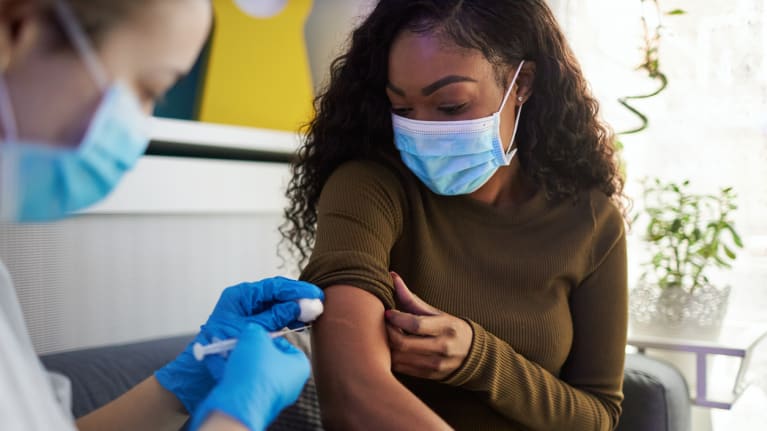
In response to the recent nationwide uptick in coronavirus cases, health care associations are calling on employers to require inoculation, and some cities are issuing mandates for high-risk workers.
COVID-19 cases are rising in almost 90 percent of U.S. jurisdictions, particularly in areas with low vaccination rates, according to the U.S. Centers for Disease Control and Prevention. "These worrisome trends are due, in part, to the rapid spread of the highly transmissible [Delta] variant," the agency said. "An increase in the number of cases will put more strain on health care resources and could lead to more hospitalizations and deaths."
In response to the uptick in cases, the American Medical Association (AMA), the American College of Physicians (ACP) and other associations are asking employers in the health care and long-term care industries to require employees to get vaccinated against the coronavirus. Additionally, some cities, such as New York City and San Francisco will soon require high-risk workers to get vaccinated.
The U.S. Department of Veterans Affairs (VA) also announced on July 26 that it will require certain health care professionals to get vaccinated. ""Whenever a veteran or VA employee sets foot in a VA facility, they deserve to know that we have done everything in our power to protect them from COVID-19," said VA Secretary Denis McDonough.
Many employers have been encouraging rather than requiring workers to get vaccinated against the coronavirus, but businesses may consider stricter policies as the COVID-19 Delta variant spreads. Since vaccines first became available, companies have offered employees a wide range of incentives to get inoculated. "We all but shamed people," said Johnny C. Taylor, Jr., SHRM-SCP, president and chief executive officer of the Society for Human Resource Management, in an interview with The New York Times. "But now we're at a point that none of that's working and we've got to close the gap."
We've gathered articles on the news from SHRM Online and other trusted media outlets.
Major Medical Associations Call for Vaccine Mandate
More than 50 health care associations, including the AMA and ACP, issued a joint statement urging employers in the industry to require vaccination. "Our health care organizations and societies advocate that all health care and long-term care employers require their workers to receive the COVID-19 vaccine. This is the logical fulfillment of the ethical commitment of all health care workers to put patients as well as residents of long-term care facilities first and take all steps necessary to ensure their health and well-being," according to the statement, which was issued on July 26. "Because of highly contagious variants, including the Delta variant, and significant numbers of unvaccinated people, COVID-19 cases, hospitalizations and deaths are once again rising throughout the United States. Vaccination is the primary way to put the pandemic behind us and avoid the return of stringent public health measures."
(CNN)
Slowed Vaccination Rates
Leaders in the health care industry said they felt compelled to act because of the slowed pace of COVID-19 vaccinations combined with the threat from the highly transmittable Delta variant. As of July 11, about 38 percent of workers in nursing care were not fully vaccinated, according to data collected by the Centers for Medicare and Medicaid Services and analyzed by LeadingAge, a nonprofit that represents nursing homes. "As our members consider a vaccine mandate, they'll do it thoughtfully. They'll do it with lots of education. And the ones that have [already] done it, they've done it with kind of an on-ramp," said Katie Smith Sloan, president and chief executive of LeadingAge, which signed on to the health care groups' joint statement. "It's not something that happens overnight," she told The Washington Post.
New York City to Mandate Vaccination for Some Employees
Public health care employees in New York City must show proof of COVID-19 vaccination or submit to weekly testing beginning in August. Additionally, teachers, police officers and other municipal workers in the Big Apple will need to be vaccinated against the coronavirus by mid-September, according to Mayor Bill de Blasio. De Blasio has also urged private employers to require their workers to get vaccinated.
San Francisco Clarifies Vaccination Mandate for High-Risk Jobs
As the COVID-19 Delta variant continues to spread, San Francisco revised a pandemic-related order to provide clarity about a vaccination mandate for workers in high-risk settings. The Safer Return Together Health Order, which was most recently revised on July 20, lifted most pandemic-related protocols, such as business capacity limits and physical distancing requirements, but the order still mandates some safety requirements. Significantly, the order requires workers in certain high-risk settings to get vaccinated by Sept. 15 unless they qualify for a religious or medical exemption. The order also urges everyone to wear masks indoors.
Judge Dismisses Lawsuit Challenging Vaccine Mandate
On June 12, a judge dismissed a lawsuit some workers had filed against Houston Methodist hospital system regarding its vaccine mandate. The employees argued that the hospital's requirement violated public policy, since the COVID-19 vaccines were distributed under the Food and Drug Administration's Emergency Use Authorization rather than the FDA's usual processes. Judge Lynn Hughes of the U.S. District Court for the Southern District of Texas said, "This claim is false, and it is also irrelevant. ... [The lead plaintiff] is refusing to accept inoculation that, in the hospital's judgment, will make it safer for their workers and the patients in Methodist's care."
When Can Employees Refuse to Get Vaccinated?
Businesses generally may require workers who enter a physical worksite to receive a COVID-19 vaccination, without running afoul of federal workplace anti-discrimination laws, such as the Americans with Disabilities Act, the Genetic Information Nondisclosure Act and Title VII of the Civil Rights Act of 1964. However, employers must consider reasonable accommodations for workers who refuse a vaccine for religious or disability-related reasons, unless such accommodations pose an undue hardship on the employer's operations.